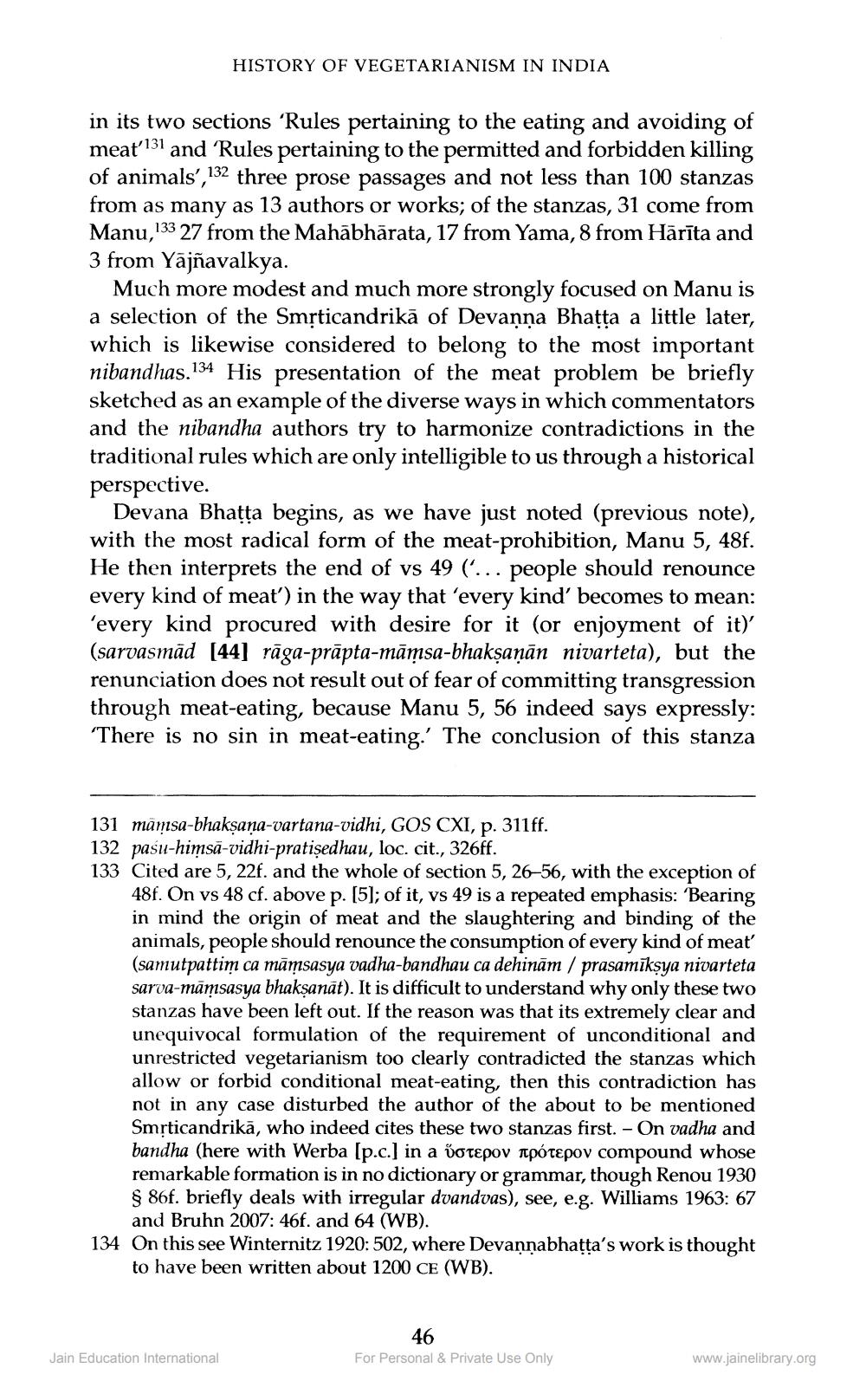________________
HISTORY OF VEGETARIANISM IN INDIA
in its two sections 'Rules pertaining to the eating and avoiding of meat 131 and 'Rules pertaining to the permitted and forbidden killing of animals',132 three prose passages and not less than 100 stanzas from as many as 13 authors or works; of the stanzas, 31 come from Manu,133 27 from the Mahābhārata, 17 from Yama, 8 from Hārīta and 3 from Yājñavalkya.
Much more modest and much more strongly focused on Manu is a selection of the Smộticandrikā of Devanna Bhatta a little later, which is likewise considered to belong to the most important nibandhas. 134 His presentation of the meat problem be briefly sketched as an example of the diverse ways in which commentators and the nibandha authors try to harmonize contradictions in the traditional rules which are only intelligible to us through a historical perspective.
Devana Bhatta begins, as we have just noted (previous note), with the most radical form of the meat-prohibition, Manu 5, 48f. He then interprets the end of vs 49 ('... people should renounce every kind of meat') in the way that 'every kind' becomes to mean: 'every kind procured with desire for it (or enjoyment of it)' (sarvasmād (44) rāga-prāpta-māņsa-bhakṣaṇān nivarteta), but the renunciation does not result out of fear of committing transgression through meat-eating, because Manu 5, 56 indeed says expressly: "There is no sin in meat-eating.' The conclusion of this stanza
131 mamsa-bhaksana-vartana-vidhi, GOS CXI, p. 311ff. 132 pasu-himsā-vidhi-pratişedhau, loc. cit., 326ff. 133 Cited are 5,22f. and the whole of section 5, 26-56, with the exception of
48f. On vs 48 cf. above p. [5]; of it, vs 49 is a repeated emphasis: 'Bearing in mind the origin of meat and the slaughtering and binding of the animals, people should renounce the consumption of every kind of meat' (samutpattim ca māmsasya vadha-bandhau ca dehinām / prasamīksya nivarteta sarva-māmsasya bhakşanāt). It is difficult to understand why only these two stanzas have been left out. If the reason was that its extremely clear and unequivocal formulation of the requirement of unconditional and unrestricted vegetarianism too clearly contradicted the stanzas which allow or forbid conditional meat-eating, then this contradiction has not in any case disturbed the author of the about to be mentioned Smrticandrikā, who indeed cites these two stanzas first. - On vadha and bandha (here with Werba (p.c.) in a votepov npótepov compound whose remarkable formation is in no dictionary or grammar, though Renou 1930 § 86f. briefly deals with irregular dvandvas), see, e.g. Williams 1963: 67
and Bruhn 2007: 46f. and 64 (WB). 134 On this see Winternitz 1920:502, where Devannabhatta's work is thought
to have been written about 1200 CE (WB).
46 For Personal & Private Use Only
Jain Education International
www.jainelibrary.org




